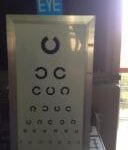Written by Thu Tran, MD,FACOG
April 21, 2014
I had been awake since 5 a.m. and could no longer fall asleep. I put on my running pants (as women in Myanmar do not wear shorts) and headed out of the hotel for a run. I was advised not to run alone, but I had to do something to build up my energy. The streets were full of flowering trees, with purple and yellow beads of flowers cascading down the trees. The Morning glories were quite stunning as I ran past a park-like setting. There were groups of adults walking together or practicing Tai Chi at the street corners.
After the morning’s “huddle” where the team leaders discussed what we would be doing for the day, the bus took us to a clinic in Shan State less than an hour away. I was separated from the group as I had to work in the women’s hospital in town. As the bus driver dropped me off, I saw a group of nurses in white caps already at the door of the hospital greeting me. I carried my supplies into their OG clinic (in Myanmar, OBGYN is known as OG). The room was clean and had two exam beds which turned out to be two long wooden tables covered with white sheets. The same sheet was used on a bed all day (unless there was much bleeding at which time I could request for the sheet to be changed). My patients in the Washington area, as you might guess, would report me to the Medical State Board if I ever practiced that way, using the same sheet for all patients.
Years ago, our practice had a patient who happened to be the host of a popular morning radio show. Several hours after seeing one of my partners as a new patient, she was on the radio making fun of our “paper” gowns. She was not angry, just amused enough to make fun of us on the radio that morning. She loved the doctor, she said, but not the gown. These days, we have patients in fabric gowns, to be washed with environment-friendly detergent. We have become “green” since the days of paper gowns. Patients in Myanmar do not have the luxury of wearing patient gowns. I examined them in their street clothes, their long skirt (longyi) pulled up and away from the edge of the table. They didn’t complain. In poverty, people may understand the difference between “essence” and “existence.” They may understand their priorities. Maybe they simply don’t have the luxury to contemplate these things.
I saw many women that morning. They were all so sweet and shy. They were fairly well dressed, as this was considered a “City hospital,” not a rural hospital. The majority of them were GYN patients with no menstrual cycles. They were all so thin, almost cachectic, so I was not surprised to see so many with irregular or absent menstrual cycles. By the end of the morning, my translator, who was a very sweet medical officer, was able to counsel patients who were experiencing an irregular menstrual cycle.
Her boss, one of the only two obstetricians there, was friendly and polite. She listened carefully to my “teaching points,” but I didn’t get the impression that she was going to change her practice to incorporate my teaching. For example, the cesarean section rate at the hospital is 60%, but she didn’t seem to be bothered. I explained to her how studies have demonstrated the advantages of a vaginal birth to both mother and baby, such as babies delivered vaginally having a lower incidence of asthma and allergies. The mother, on the other hand, will have less risk of future medical problems including hysterectomy which, before menopause, can increase their risk of heart diseases, even with intact ovaries.
But, what could I expect? Human behavior is such a challenge to change. When I was Chair of the OBGYN department at my hospital for two years (my term ending only this past January) I knew many obstetricians didn’t like the way I “preached” about their cesarean section rates, several with rates of at least 30%. I brought a Harvard article discussing the advantages of having a vaginal birth, and I shared recommendations from NIH to impress upon them the need to reduce their cesarean section rate. I saw little, if any change the year after. If I was to work in this hospital in Myanmar, I would have frequent laryngitis preaching to doctors about avoiding these unnecessary “festivals of steel,” as I call them. I even heard from a consultant how obstetricians in Myanmar prefer to perform cesarean sections because of the higher reimbursement fee. Obstetrics, I was told, is the highest paid specialty in Myanmar. How would you like your doctors to perform unnecessary procedures on you,including one which causes more blood loss and infections? We physicians have to walk in our patients’ shoes, I said to myself, if we want to be our patients’ true advocates for good health.
I learned from the medical officers how there was no malpractice problem in Myanmar. Doctors are treated like heros of society. No patient would question the knowledge of their doctors. After all, there are many more mosquitoes in Myanmar than lawyers. You and I know the reverse is true in the U.S. where there are probably more malpractice lawyers, not just lawyers in general, than mosquitoes! The officers laughed in disbelief as I told them stories about the malpractice situation in the U.S. for Obstetricians. I didn’t even tell them that, despite a completely malpractice claim-free history, I have to pay $85,000 a year in malpractice insurance to be allowed to practice Obstetrics. I did not want to lose the medical officers who served as my translators to a heart attack if they heard this absurd fact about practicing Obstetrics in America! Maybe we should export some malpractice lawyers to Myanmar?
A 46 year old patient with a known history of ovarian cancer was seen that morning for pelvic pain. She had an ovarian “cyst” removed in 2010 with NO pathology report! She continued to have pain and, a few weeks ago, had her abdomen reopened (there is no laparoscopy in Myanmar yet!) and was found to have metastatic ovarian cancer. The gynecologist performed a biopsy on the “mass” then closed the patient. She will have to wait for a “general surgeon” to reopen her for the “debulking” procedure. For those who are not familiar with this term, debulking is to remove as much of the cancerous tissues as possible. It is the one critical step which can prolong or shorten your life with ovarian cancer. The surgeon’s skill is so vital as he or she must leave behind as little tumor as possible. To listen to this patient’s story, I wished she had the means to travel to Yangon, which is 15 hours away, to have her surgery performed by a Gyn Oncologist, the specialist who performs Gyn cancer cases.
Another patient, a 53 year-old woman, came in with the complaint of “watery discharge from the vagina” and right pelvic pain radiating to the right leg. Her uterus had been removed a year ago because of cervical cancer. I didn’t like her presentation, as I already knew what likely had happened. My exam confirmed my suspicion. She now had recurrent cervical cancer with a 12 cm mass sitting above the vaginal cuff. Was it “recurrent” or “persistent”? I thought I knew the answer. What will happen to her now in Myanmar (or even if she was in the US)? I think you know the answer. I didn’t know what else to do for her other than to hand her a bottle of 80 tablets of Advil. I knew I merely placed a small bandaid on a wide open wound, but what else could one do?
I came back to the main hospital to join the team. Almost everyone was done for the day except for the ophthalmologist Dr. Michael Nguyen, a Johns Hopkins-trained retina surgeon who practices in Seattle. I heard he had seen 110 patients on that first day, with the line of patients extending beyond the hallway. Michael was sweating but still composed, calmly counseling his patients, some of whom were children. He was able to train Quan, a pharmacist from Dallas, to be his technician to perform simple eye exams. She saved him a lot of time that day. I snapped a photo of Michael performing an eye exam on a two year-old with bilateral cataracts secondary to rubella infection. In Myanmar, only certain vaccines are given to the moms, and rubella is not one of them. Michael subsequently saw two more children with rubella infection in that clinic.
I was there too when he informed a 22 year-old woman how it was too late to perform surgery on her eye with retina detachment. He explained this was the case because it had been detached for ten or more years. She was crushed, as I would have been too.
After helping the pharmacy team close down their area, we left the building, exhausted from the heat and the workload. Dinner was late, and as the night before, bedtime was late. Before I could sleep, I still needed to finish an outline for my lecture the next day to the pregnant patients in the clinic. The chief obstetrician was excited about me giving her patients a talk about … everything from nutrition to exercise to all the important nuisance symptoms a pregnant woman might experience during pregnancy – similar to advice I give to my patients at home during their first pregnancy.
That night, I had very little sleep again, maybe two or three hours. A dog was howling breaking the quiet of the night. He howled constantly around 2 a.m. as if he was telling the stories of his life, a life of disenchantment. I thought I packed everything I needed for the trip, as I have travelled the world so extensively and usually am a compulsive packer. I had even packed a pair of eye shades, just to find out I didn’t need them, as the Myanmar nights were very dark. I hadn’t thought about ear plugs until that dog was mourning about his life! I wondered if my lecture to the pregnant patients in the morning would be like that dog’s howling? Would I be howling in English while the whole room was wondering what I was talking about? Maybe the translator would be good, I hoped, as I was told I would have another medical officer to help me. Maybe the patients would understand at least 50% of what I wanted them to know, as knowledge is a powerful tool to break the barrier of ignorance. Knowledge empowers people and makes their lives more meaningful. Knowledge is a stepping stone to progress. It allows people to make smart choices and take control of their lives. Don’t you want to be in control of your own destiny?
Tags:














